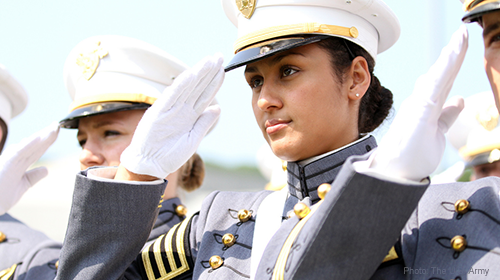
West Point, the Naval Academy in Annapolis, and the Air Force Academy in Colorado Springs are all top-tier educational institutions owned and operated at taxpayer expense by the United States government. They provide an elite education and leadership training to some of the best and brightest students free of charge. Considered the crown jewels of military leadership training, the academies produce officers who often go on to become the nation's military brass.
They also just happen to disproportionately benefit men, and we're trying to find out why, despite the Pentagon and the three academies' opposition.
While women were first allowed into the academies almost 40 years ago, their numbers at West Point have remained between 14 and 20 percent of the class for more than a quarter of a century. Numbers are a little higher at the Naval Academy, where women have finally hit a quarter of the entering class this past year, and at the Air Force Academy, where women remain under a quarter of the class. By admitting so few women, the academies reinforce and reproduce the military's "brass ceiling" resulting in a small number of women serving as top military officers.
The low numbers of women at these schools are also mysterious. Women have been allowed to go on to serve in combat roles in the Navy and the Air Force for decades – in fact, in the Air Force, more than 99 percent of positions have been open to women for years. West Point maintains so-called "class composition goals" of between 14 and 20 percent women. It's unclear why West Point wants so few women in its classes, particularly now that women have spent more than a decade serving in ground combat. The situation grows murkier still, considering the Pentagon has lifted its ground combat exclusion policy, opening the way for women to serve in an increasing number of specialties and units, including the combat arms.
To learn more about the skewed gender makeups of these federal academies, the ACLU has teamed up with the Service Women's Action Network, the ACLU of Connecticut, and the Yale Law School Veterans Legal Services Clinic. We submitted requests under the Freedom of Information Act to the academies, and this week, after the Defense Department declined to provide answers to our requests, we filed a FOIA lawsuit asking a federal court to require the government to turn over the requested records. In addition to basic admissions data, we asked for records that will shed light on the process of getting into these academies, including the process of securing congressional nominations, the screening of applicants, and the climate for students once they arrive at the schools.
The Constitution prohibits the government from excluding women from opportunities without what the Supreme Court, in the case against the Virginia Military Institute, called an "exceedingly persuasive justification."
To date, the government hasn't offered any justification for offering its competitive, free college education to three times more men than women. Through this lawsuit, we hope to learn more about the barriers facing women in getting into these schools, and the justifications, if any, for admitting so few of them.
Learn more about women in the military and other civil liberty issues: Sign up for breaking news alerts, , and .

